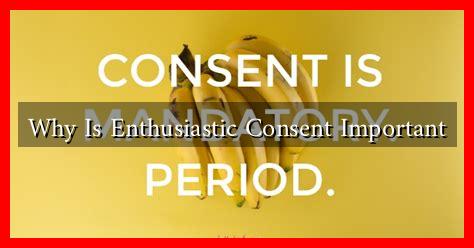-
Table of Contents
Why Is Enthusiastic Consent Important?
In recent years, the concept of consent has evolved significantly, moving beyond the traditional understanding of mere agreement to a more nuanced and affirmative approach known as enthusiastic consent. This shift is crucial in fostering healthy relationships and ensuring that all parties involved feel respected and valued. In this article, we will explore the importance of enthusiastic consent, its implications in various contexts, and how it can contribute to a safer and more equitable society.
Understanding Enthusiastic Consent
Enthusiastic consent is defined as a clear, affirmative, and voluntary agreement to engage in a specific activity, particularly in sexual contexts. Unlike the outdated notion of consent, which often relied on silence or lack of resistance, enthusiastic consent emphasizes the importance of active participation and eagerness from all parties involved. This concept is rooted in the belief that consent should be:
- Clear: Consent must be communicated openly and without ambiguity.
- Ongoing: Consent can be revoked at any time, and all parties should feel free to change their minds.
- Informed: All individuals should have a full understanding of what they are consenting to.
- Freely given: Consent should not be obtained through coercion, manipulation, or pressure.
The Importance of Enthusiastic Consent
Enthusiastic consent is vital for several reasons, including promoting healthy relationships, preventing sexual violence, and fostering a culture of respect and communication. Here are some key points to consider:
1. Promotes Healthy Relationships
Enthusiastic consent encourages open communication between partners, which is essential for building trust and intimacy. When individuals feel comfortable expressing their desires and boundaries, it leads to:
- Stronger emotional connections.
- Increased satisfaction in sexual experiences.
- A greater understanding of each other’s needs and preferences.
2. Prevents Sexual Violence
Statistics show that a significant percentage of sexual assaults occur due to a lack of clear consent. According to the Rape, Abuse & Incest National Network (RAINN), an American is sexually assaulted every 68 seconds. By promoting enthusiastic consent, we can help reduce these alarming numbers. Key strategies include:
- Educating individuals about the importance of consent from a young age.
- Encouraging bystander intervention in situations where consent is unclear.
- Creating safe spaces for open discussions about consent and boundaries.
3. Fosters a Culture of Respect
Enthusiastic consent is not just about sexual encounters; it extends to all forms of interaction. By adopting this mindset, we can cultivate a culture that values respect and empathy. This can lead to:
- Reduced instances of harassment and bullying.
- Greater awareness of personal boundaries in various contexts.
- A more inclusive environment where everyone feels valued and heard.
Case Studies and Real-World Examples
Several organizations and movements have successfully advocated for enthusiastic consent, leading to positive changes in societal attitudes. For instance:
- The Consent is Everything campaign focuses on educating young people about the importance of consent through workshops and interactive activities.
- The #MeToo movement has highlighted the need for clear and enthusiastic consent, prompting discussions about accountability and respect in various industries.
Conclusion
Enthusiastic consent is a fundamental aspect of healthy relationships and a crucial tool in the fight against sexual violence. By promoting clear communication, respect, and understanding, we can create a safer and more equitable society for everyone. As we continue to advocate for enthusiastic consent, it is essential to educate ourselves and others about its importance, ensuring that all individuals feel empowered to express their desires and boundaries. In doing so, we not only enhance our personal relationships but also contribute to a broader cultural shift towards respect and empathy.

